By the Letter: Creeley, Eigner, Dorn, & Zukofsky
The four letters by Robert Creeley in our October 2013 issue trace some of his evolving feelings toward poetry (and Poetry) over the course of the fifties and sixties. These letters to Larry Eigner, Jonathan Williams (jokingly called “dad”), Edward Dorn, and Louis Zukofsky offer insight into Creeley's poetics, his daily life, and his relationships with each poet. As Rod Smith mentions in his introduction, this selection is only a small fraction of Creeley's profuse output. This post aims to track a bit more of these poets’ relations with Poetry and their overlapping personal/professional ties.
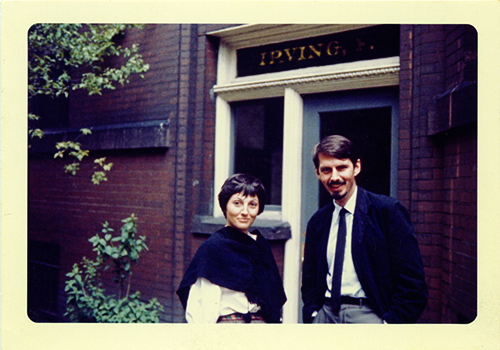
“And by way of contradicting Cid, though I haven’t seen a recent issue, POETRY is a kind of sloppy magazine in itself….” —Robert Creeley to Larry Eigner, circa 1950
The first letter in the “Four Letters: 1950-1968” portfolio is to Larry Eigner, written approximately seven years before Creeley first published in Poetry in August 1957. The poem, “Sing Song,” begins:
I sing the song of the sleeping wife,
who married to sleep,
who would not sleep simply to get married.
(Creeley’s biographical sheet for his first publication appears in the portfolio, where he divulges his pseudonym “Thomas White,” among other succinctly documented details.)
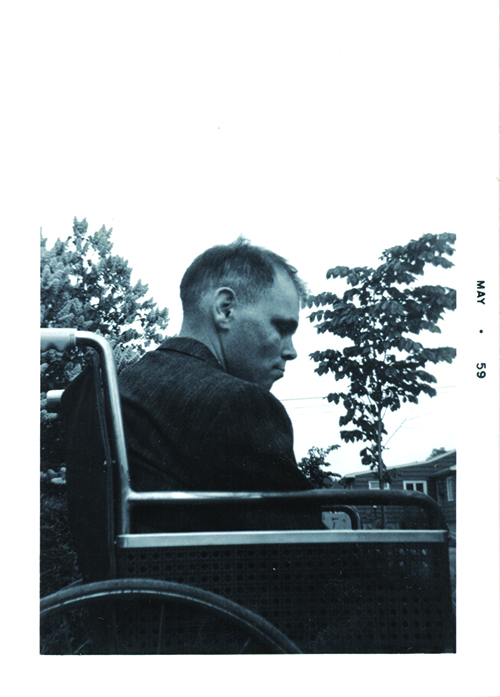
Eigner himself didn’t appear in Poetry until twelve years after Creeley's letter, with six poems in the September 1962 issue:
Piercing the wall the window
reflection the streetlamp
all those channels from the sun
dangling to roots shut the room
you flicker through time
Eigner went on to publish over thirty poems in the magazine during the sixties.
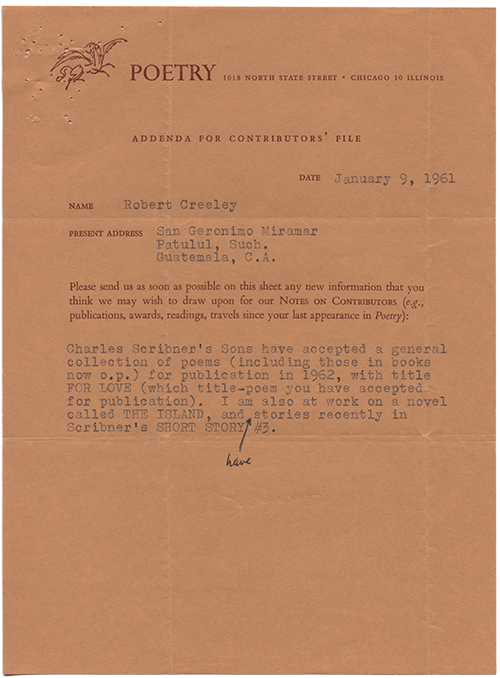
Creeley’s letter to Ed Dorn on January 5, 1961 was written just four days before Creeley responded to Poetry’s acceptance of his poem “For Love.” The poem was published in May 1961:
Can I eat
what you give me. I
have not earned it. Must
I think of everythingas earned. Now love also
becomes a reward so
remote from me I have
only made it with my mind.
Creeley would go on to publish many dozens of poems and book reviews in Poetry throughout the sixties, including reviews of Mexico City Blues by Jack Kerouac and Ko, or a Season on Earth by Kenneth Koch (under the title "Ways of Looking," June 1961), Run with the Locals by Charles Bukowski and My Friend Tree by Lorine Niedecker (in April 1963), All: The Collected Short Poems, 1923- 1958, by Louis Zukofsky (October 1965), and three books by Charles Olson, including The Human Universe and Other Essays and A Bibliography on American for Ed Dorn (October 1966), among many others. Though Creeley never did, as far as we can tell, review Dorn’s book as he promised in his letter.
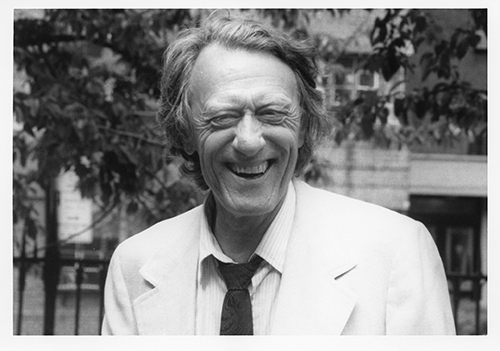
Dorn published in Poetry only a handful of times. His first appearance came with three poems in the February 1964 issue. Among that group is “Dark Ceiling,” a poem we liked so much we included it in our centennial anthology:
Broad black scar the valley is
and sunday is
where
in the wide arc
the small lights of homes come on
in that trough.Burnish my heart
with this mark
You'll want to read the whole thing. Or listen to it read by Dan Epstein.
Later that year Dorn reviewed W.S. Merwin’s The Moving Target ("I have read through The Moving Target twice now and I find I don't have any great enthusiasm for it. I will try to assess why.") and then published two more poems in March 1967, “The First Note” and “The Sundering U.P. Tracks”:
You talk of color?
Oh cosmological america, how well
and with what geometry
you teach your citizens
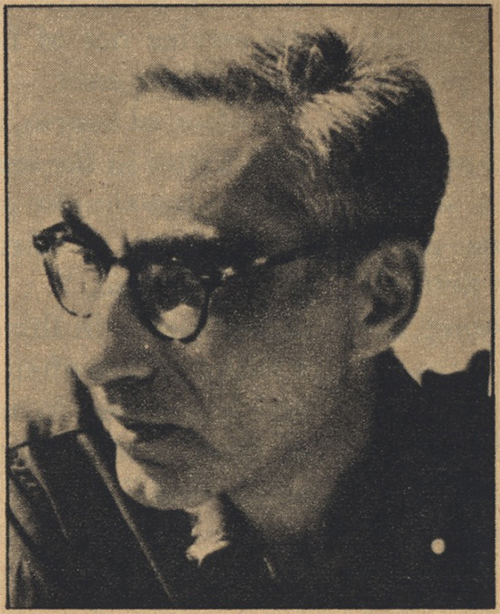
Louis Zukofsky appeared in Poetry long before anyone else here. His first poem in the magazine, “Of Dying Beauty,” was published in January 1924, the month Zukofsky turned twenty years old.
He next appeared five years later with the seven-sectioned “Siren and Signal”:
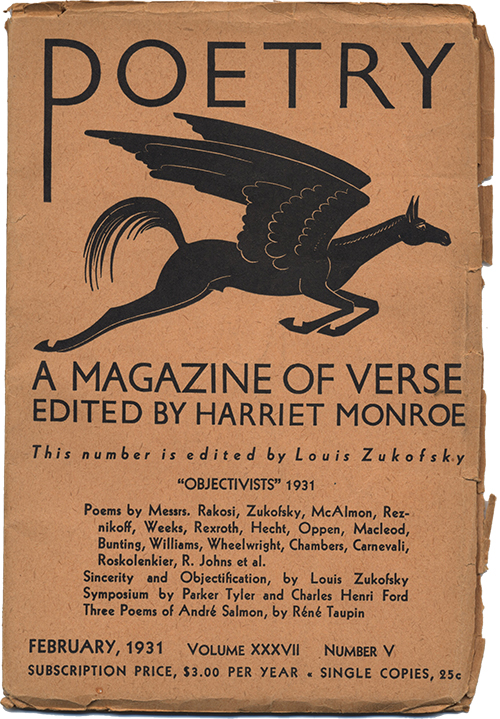
Then, in February 1931, Zukofsky edited an entire issue of Poetry dedicated to Objectivism. It included poems by Carl Rakosi, William Carlos Williams, George Oppen, Charles Reznikoff, Basil Bunting, and many others. Also published in the issue was Zukofsky’s own “‘A’: Seventh Movement.” Nearly a dozen other sections of “A” would appear in Poetry throughout the thirties, forties, and sixties.
In May 1958, less than a year after Creeley’s first appearance in the magazine, Zukofsky reviewed his book The Whip, which was published by Jonathan Williams. The review was titled “What I Come To Do Is Partial,” and it mostly lets Creeley’s writing talk for itself. Zukofsky's opinion of the book is summed up in the last sentence of his review:
The poems are to be praised for not counting up to the ‘conceit’ of rhetoric, which a generation or so ago misnamed "metaphysical," whose thought presumed more hope than the voice of a limited body.
(Sidenote: As mentioned in the "Four Letters" portfolio, Williams was a publisher as well as a poet, and while this book review is the extent of his relationship with the magazine, we have several of his poems in the online archive.)
We could go on to note Zukofsky's dozens of other appearances, but we'll cut to the chase: Henry Rago dedicated an entire issue of Poetry to Zukofsky in October 1965. It features a long section of "‘A’-14" and several reviews of his books (for those of you keeping track, yes, this is the issue in which Creeley's review of Zukofsky's All appeared).
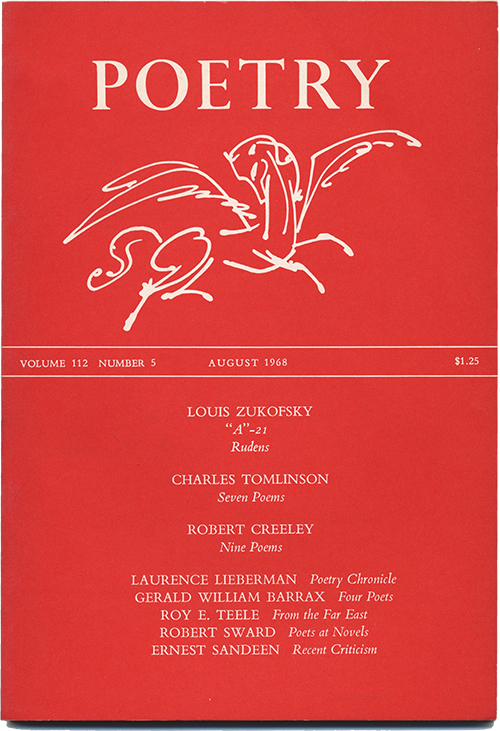
As Creeley mentions in his letter to Zukofsky, they also appeared together in the August 1968 issue of Poetry, which included nine poems by Creeley and the first two parts of Zukofsky’s “‘A’-21: Rudens" (the third part appeared in the following issue, September 1968). Creeley’s section opened with the poem “Chicago”:
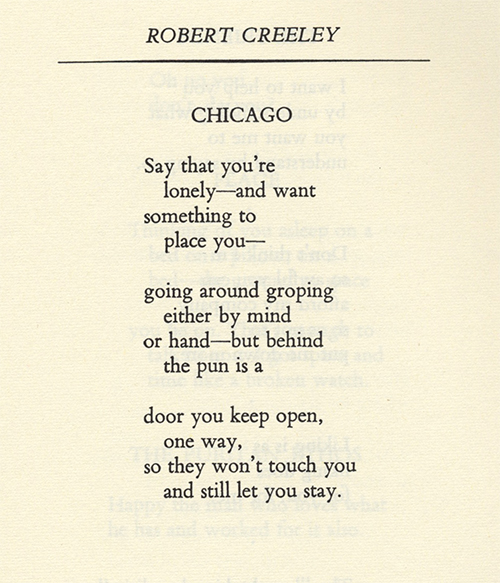
Zukovsky’s last appearance in the magazine came with the publication of “‘A’-22" (Part II) in April 1974, four years before his death in 1978.
As for Creeley, he practically bookended the sixties. After publishing nearly sixty poems in Poetry over the course of the decade, his last poem in the magazine, “So Big,” was published in November 1969:
The
movie goes on,
the peoplehurt each other.
Now say to her,
love is all.
Use this post as a jumping off point for your own explorations in the Poetry magazine archive. There are plenty more poems by Creeley, Zukofsky, and the others mentioned here, as well as poems by other Black Mountain poets who published in the magazine over the years: Charles Olson, Denise Levertov, Robert Duncan, Hilda Morley, et al.


